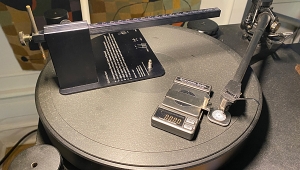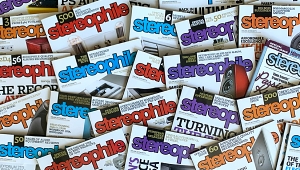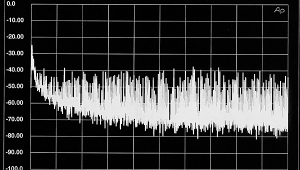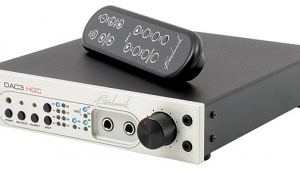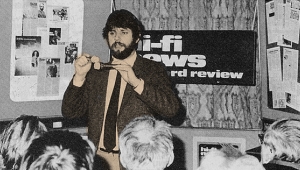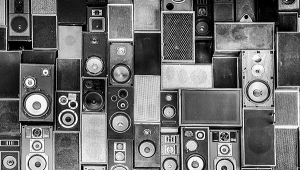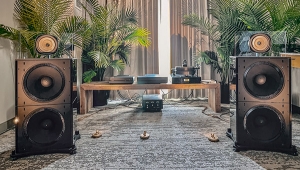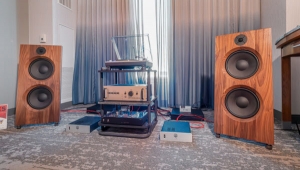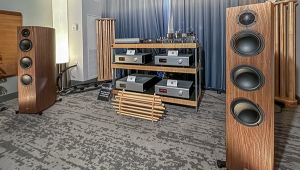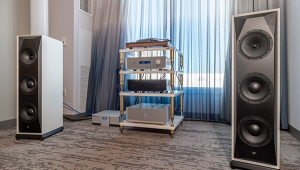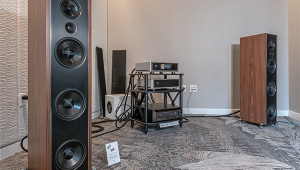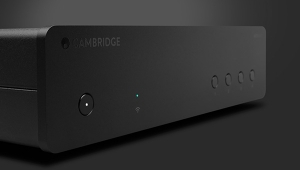| Columns Retired Columns & Blogs |
As Reviewers See It Page 7
Mitchell: This discussion is going on two different levels. What is the sound source that the reviewer has in mind when he's evaluating the equipment? And on that score, you can equally well judge equipment either by playing a recording of a soprano singing a Handel aria or of a rock guy playing a Fender Stratocaster. If you know what the source sounds like, you can competently judge the equipment.
The second problem is, how do you convey that judgment to the reader? I think it behooves us to try to talk about our process of evaluating equipment by using references that the reader can somehow mimic for himself. I suspect many more readers can have access to live unamplified acoustic sources than are likely to have access to the live sound of the Stratocaster...
English: There are probably 20 places in any given small town on a given night where you can find someone playing a Fender Stratocaster but [not be able to] attend some classical music performance. I think this is an age- and culturally split kind of issue, and there are other factors that enter into this issue. All of us will find the type of music we want in the places we live.
Atkinson: All of us find our way to the music recordings or source material we find most useful in reaching our value judgments. What's important is that those value judgments reflect that our primary responsibility is to the truth.
Accuracy vs Musicality
• If you don't enjoy the sound, that doesn't mean that the system is inaccurate.
• If you enjoy the sound, that necessarily means that the system is accurate.
Hammond: You're saying that enjoyment and accuracy go hand in hand.
Atkinson: That Gordon's "goosebump" test is the most important. Or, as Corey would say, "The monkey bone doesn't lie."
Hammond: Whichever bone that is. [laughter]
Tellig: I think you can only enjoy something that's inaccurate for a short time. Or if you are not very experienced as a listener of stereo equipment, you might like a notoriously colored amplifier. But over time, it's very hard to enjoy something that isn't accurate.
Holt: I disagree. First of all, there are many natural sounds, many musical sounds, that I don't like, that other people may not like. If you hear these accurately reproduced, you're not going to like them.
Archibald: You're saying there's a complete disjunction between pleasure and accuracy?
Holt: Yes.
Norton: Sure.
Atkinson: But how do you distinguish between accuracy to a recording that is bad and something which is itself inaccurate?
Greenberg: The entire recording process is a bent tool. From microphone to mastering, whether it's CD or LP, it's a bent tool. There's two paths you can take. You can use a complementary bad tool to reproduce it, which will then result in pleasing sound. Or you can use a completely neutral tool which will reveal the bend in the recording which may not be as pleasant or as natural sounding.
Lipnick: Live music, the kind of music I play, quite often does not sound pleasant to the ear. It can sound rather unpleasant. It can sound downright nasty. Now, the thing is, if it's on the recording, what do you want? Do want to hear something that sounds "nice," or do you want to hear what really happened? These are two different things.
Archibald: However, live music never sounds like a ringing tweeter or an overloading amplifier, or an early '70s solid-state preamp. Live music never sounds like that.
Olsher: To put this into a practical perspective, what you'll be listening to when you do an evaluation are your favorite LPs, CDs, master tapes. These are things that you have lived with for a long time, you have a good feeling for what these things are capable of, what their sonic potential is, what the musical involvement factor should be. Now, if the product under test consistently screws up on every one of those things, the conclusion has to be that it just plain fails to capture what it should be capturing. If, on the other hand, some of your records sound good and some of them don't sound good, it's something you need to investigate as to why that is. You perhaps are not catering to the needs of that particular product. Should you change something? Can you make those records that don't sound good sound better? You have to look at it from the standpoint of what you know best, but clearly I would argue that if you enjoyed the product over an extended period of time, by definition it can't be bad. [hubbub]
Hammond: It wasn't "bad"...
Holt: We're talking "accurate"...
English: I agree with what Gordon was saying. I think the two are dissociated. Yes, it's wonderful to have accuracy for things you already enjoy, but if there's music I really enjoy I'll listen to it on anything, and I don't care how accurate it is, I'm going to enjoy it.
Archibald: "Pleasantness" doesn't equal "enjoyment."
Tellig: Are we confusing "enjoyment" with "interest"?
Holt: No.
- Log in or register to post comments

